Confession: when I was a teen Little Women’s title made me cringe. It made me wince, clench my jaw, and even grind my teeth a little. Something about it was so…diminutive. Little Women? It felt demeaning, and a little insulting even. As if these women, whoever they were, were shrunk down and jammed unceremoniously into a dollhouse. Like they were nothing more than teeny tiny little trinkets to be tossed about, played with, and then promptly forgotten about.
How could anyone take a book like this seriously?
The women I knew, the women that raised me on a steady, nourishing diet of possibilities, and hope, were masters of courage, dignity, and persistence. They survived financial hardships, the sting and stigma of abuse in all its shades, and bone-deep traumas. With mighty tiger-glints in their eyes, I could rely on them for strength, support, and as a constant, unwavering force in my life. They could face horizons of shadowy unknowns and whatever storm prowled in the distance head-on.
They had thunder in their blood and bones.
There was nothing little about the women in my life or the lessons they had to teach me.
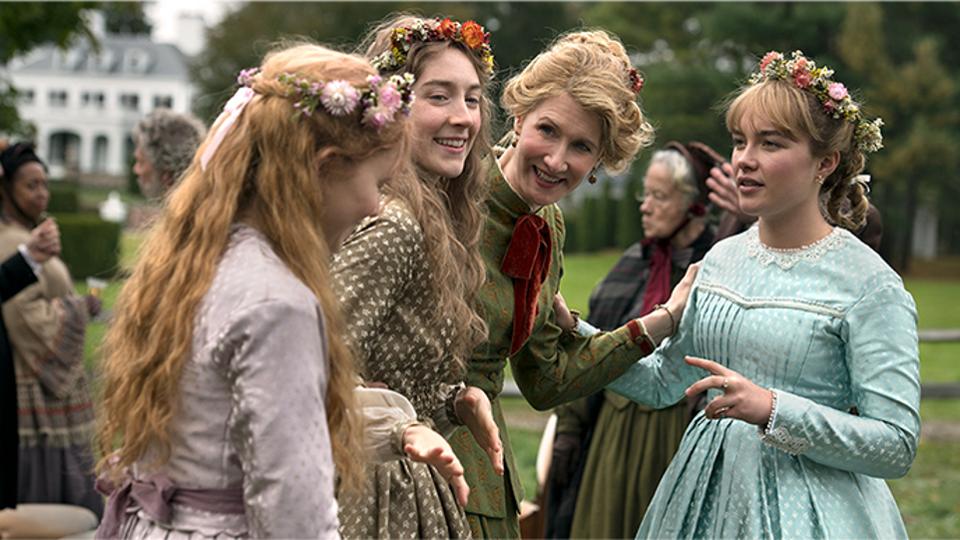
Likewise, there’s nothing little about the March sisters in Greta Gerwig’s Little Women.
Following the Civil War-era girlhood of five extraordinary women, Gerwig’s Little Women resonates with feminist statements that have endured from the 19th century when Louisa May Alcott’s novel was published. Gerwig’s take on the March sisters’ saga is unlike any of the film adaptations that came before it. Driven by a non-linear and more inclusive narrative, this Little Women goes far beyond the novel’s iconic heroine Jo March.
Jo’s feminism isn’t the only one with value in this adaptation. For the first time, really, we get to know all of the March sisters and where they fall on the wider spectrum of femininity and feminism.
At its heart Little Women is a love story, a family drama, a tragedy, and a poignant look at the many facets of female ambition and desire. And the lessons we can glean from the March sisters (and Alcott) are just as relevant today as they were over 150 years ago.
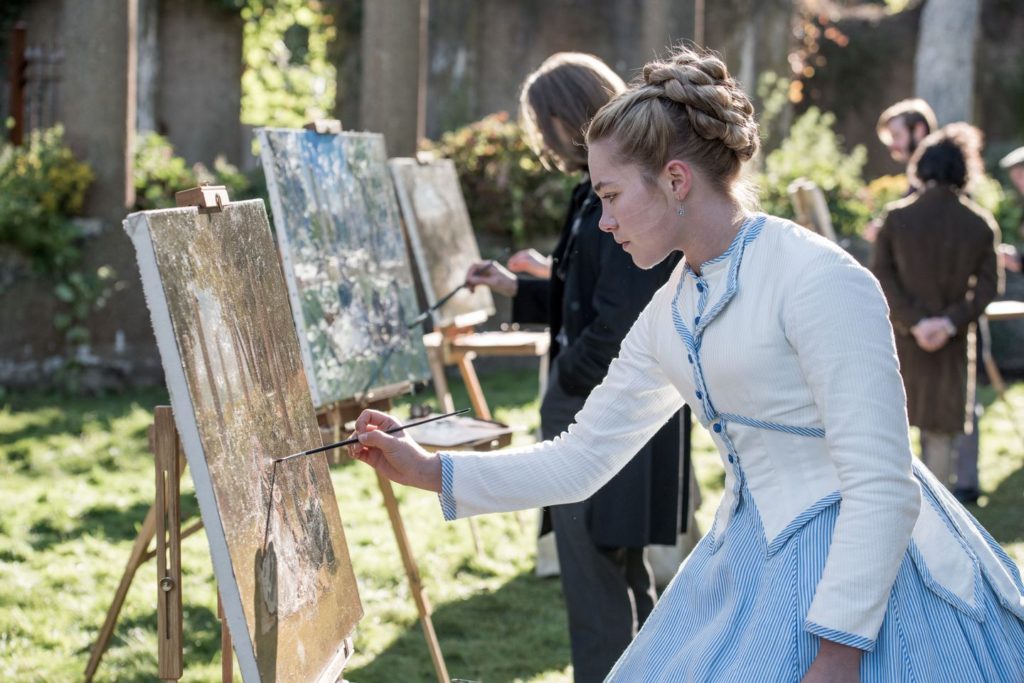
Amy
As a woman I have no way to make money, not enough to earn a living and support my family. Even if I had my own money, which I don’t, it would belong to my husband the minute we were married. So don’t sit there and tell me that marriage isn’t an economic proposition, because it is. It may not be for you but it most certainly is for me.”
Amy March (Florence Pugh)
Florence Pugh breathes life into the irrepressible and ambitious Amy in ways that no other Little Women adaptations have before. While Amy March is still at times insufferable, she has more maturity and depth in this adaptation. Amy’s unshakable confidence and her commitment to become an artist is, well, kind of badass.
In Gerwig’s Little Women we see more sides to Amy than just the bratty, cocky little girl she’s often depicted as. Although at first blush Amy seems vapid and abrasive, it’s soon evident that self-respect and honestly belie those qualities. Nowhere is this more poignant than halfway through the film when Amy is invited to go to France with Aunt March (Meryl Streep). Fueled by an uncompromising ambition to make her artistic passion a reality, Amy is not content to just imagine a swoony life painting. With all the zeal of a modern-day woman, Amy’s motivation is a force to be reckoned with. She’s willing to put in the time, effort, and do what it takes to achieve her dream. Even if that means getting hitched.
When a day-drunk Laurie (Timothée Chalamet) confronts her in her art studio, criticizing her for pursuing a wealthy husband Amy calls him out on his judgmental double-standard BS. She knows that marriage is indeed an economic proposition and is willing to use that to advance her own career and to make the life she desires.
Florence Pugh’s nuanced portrayal of Amy is enough to make us all reconsider our biases towards the youngest March sister.
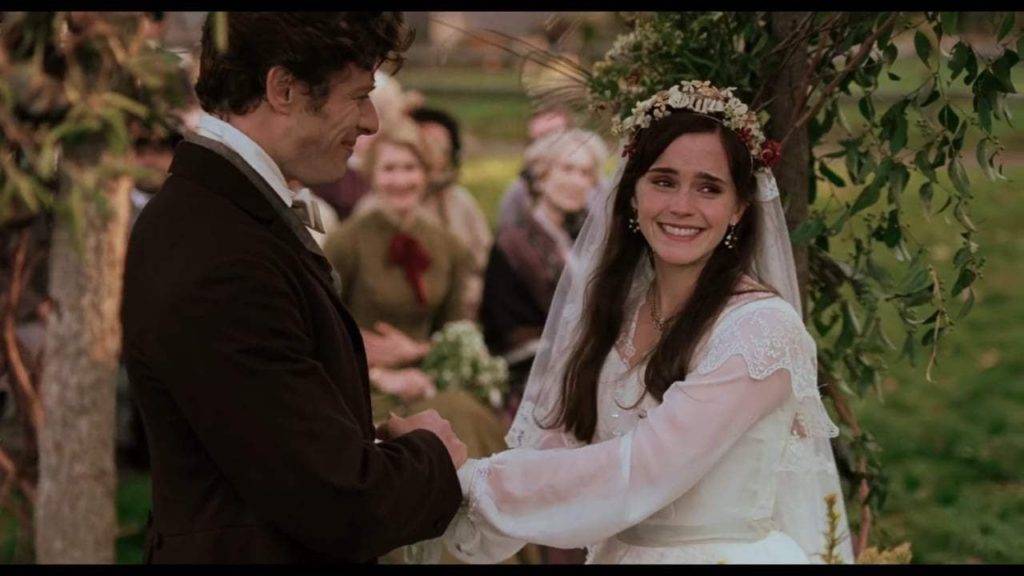
Meg
Just because my dreams are not the same as yours doesn’t mean they’re unimportant. I want a family and a home and I’m not scared of working and struggling, but I want to do it with John.”
Meg March (Emma Watson)
Meg is the most conventionally feminine March sister. With her aspirations of marriage and motherhood, Meg March is almost as misunderstood as Amy. After all, in a way Meg is the “anti-Jo.” Wearing pretty dresses, attending coming out balls, and chasing around toddlers is hardly a satisfying life for a character like Jo. But, it’s what Meg genuinely wants.
Feminist icon and all-around badass babe Emma Watson plays the eldest March sister with vulnerability and quiet passion. A social butterfly and sensitive romantic, Meg dreams of creating her own family and settling into her own household. In Gerwig’s Little Women, Meg’s classical femininity isn’t ridiculed. Her lifestyle, although it’s the opposite of what Jo wants, is respected and seen as a viable way of life.
Unfettered by Jo’s fierce abhorrence of marriage, Meg falls into a charming fairytale romance with Laurie’s tutor, John Brooke ( James Norton). Her decision is given the value and attention it deserves. By marrying the man she loved, Meg didn’t “degrade” herself, settle, or sacrifice any grand future. Her future is love.
Meg even asserts to Jo: just because my dreams are different than yours doesn’t mean they’re unimportant. A noble poetic land-mermaid, she married for love, not wealth and not out of any obligation. The eldest March accepts all the challenges, complicated emotions, and pain that comes with living a more humbled life.
The core of the lesson we learn from Meg is that it’s not anti-feminist to raise a family. Strength and power can manifest in choice, and Meg’s includes being a wife and mother.
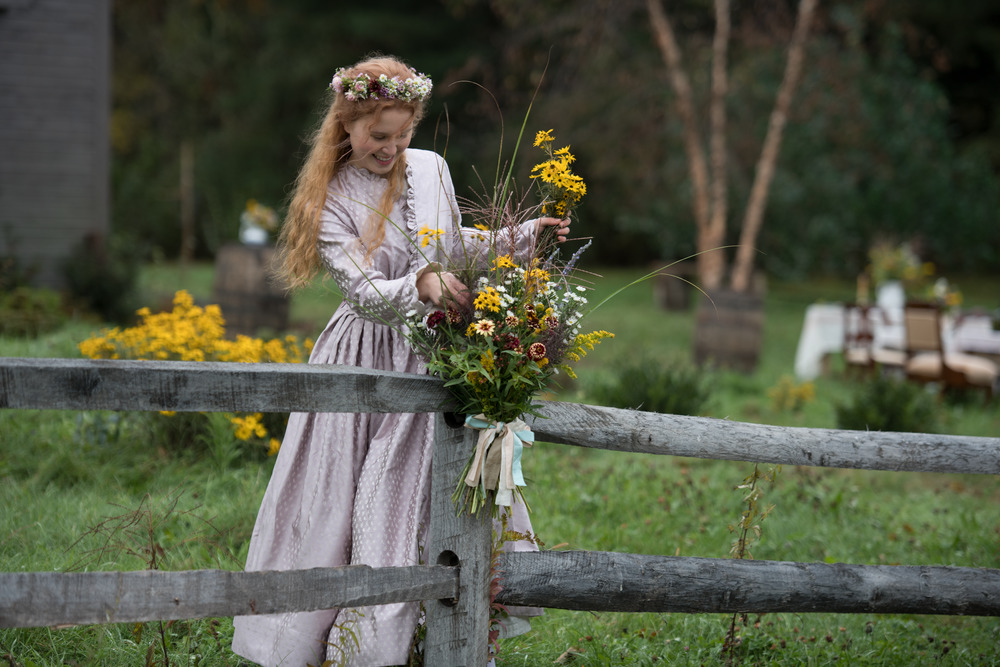
Beth
Eliza Scanlen portrays the tender-hearted, terminally-shy, Beth. The middle March sister is an unconditionally loving friend, daughter, and sister. She’s an immensely talented piano player who cherishes time spent surrounded by loved ones.
TL;DR, Beth is the ultimate Hufflepuff.
As in the novel and every other stage or screen adaptation, her altruism (in this instance tending to sickly neighbors when none of her sisters can be bothered) ultimately compromises her own health. Because of her unhesitating unselfishness, Beth succumbs to illness at just 22 years old.
Beth’s soft-spoken nature and gentleness tempers Jo’s tempestuousness and summons a sense of calm, ease, and security.
The beautiful tear-jerking scene with Beth and Jo sitting closely together on the windy, briny, beach illuminates that peacefulness that Beth radiates. It’s so heart-achingly sincere that this moment could make even the most stoic cynic burst into tears.
One of the most iconic death-positive characters on the literary landscape, Beth has an admirable acceptance of the end of her life and deep gratitude for the life she was privileged to lead. Ultimately the peacemaker of the March family, Beth is the embodiment of goodness and the power each of us has to take action.
Beth’s greatest lesson and lasting legacy is that every action we take has meaning. We have the power to make the world a better place in the ways that only we can.
Is Beth my favorite March sister? Yes. Yes, she is.
And OF COURSE, there’s Jo.
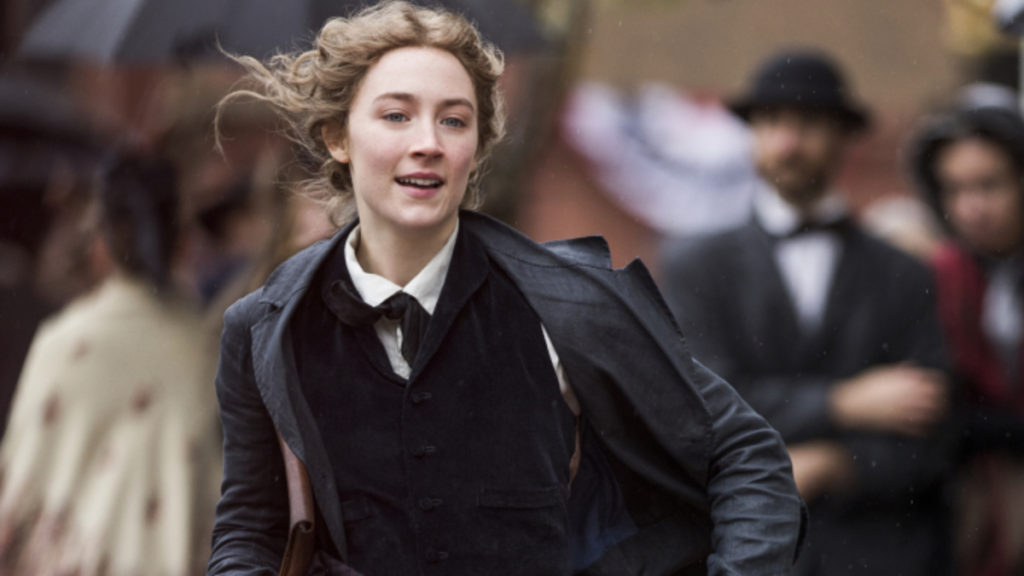
Jo
Women, they have minds, and they have souls, as well as just hearts. And they’ve got ambition, and they’ve got talent, as well as just beauty. I’m so sick of people saying that love is just all a woman is fit for.”
Jo March (Saoirse Ronan)
The indomitable Irish actress Saoirse Ronan steps into the shoes of the headstrong heroine Jo March, the character everyone instantly imagines when anyone says Little Women.
Bold, rebellious, and free-spirited, Ronan’s Jo is a powder keg of unbridled creativity and emotion.
The fan-favorite March sister and enduring feminist icon, Jo’s cravings for freedom and her relentless pursuit for her passions make her a role model for girls boys humans of all ages. Although her stubbornness hinders her at times, Jo ultimately represents that you can accomplish anything as long as you believe in yourself and take action.
One of the biggest turning points comes in the final act of Little Women when Jo realizes she doesn’t have to regret “not being born a boy.” Through Ronan’s powerhouse performance, Jo asserts that even though she is a woman, she doesn’t have to be restrained and restricted by gendered expectations. Jo’s far too formidable with too much raw passion and strength to be punched into submission by tongue-clucking, gender policing naysayers.
Years later, a city-dwelling Jo finds herself developing feelings for Friedrich Bhaer (Louis Garrel) a German lodger at her New York City boarding house. More mature and established years after rebuking Laurie’s marriage proposal, Jo realizes she does want to marry after all. But on her own terms. And to someone she loves. Not someone who passively only loves her.
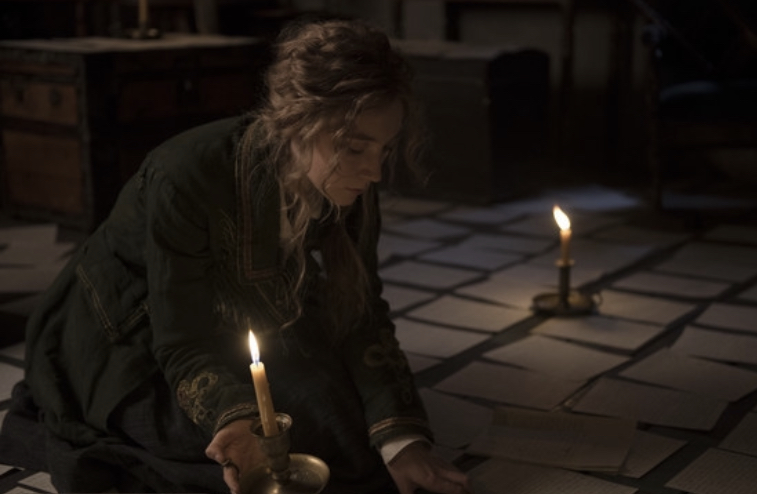
A mild-mannered professor with brutally honest and encouraging opinions, Friedrich challenges Jo as a person and a writer. He urges her not to compromise her own creative integrity simply to making money writing for newspapers that demand she be something she’s not. He knows Jo’s talent as an author far exceeds the schlocky drivel the city papers hunger to sell.
It’s Friedrich’s push and Beth’s death that turn the key in unlocking Jo’s full potential as a writer.
In one of the most empowering, goosebump-inducing scenes we witness Jo writing in the attic by candlelight into the wee hours of the morning. The patron saint of aspiring female writers, Jo’s hand feverishly scribbles across blank page after blank page. And soon, the entire room is filled with the stories she needs to tell. Stories that contain all the multitudes inside Jo and her sisters.
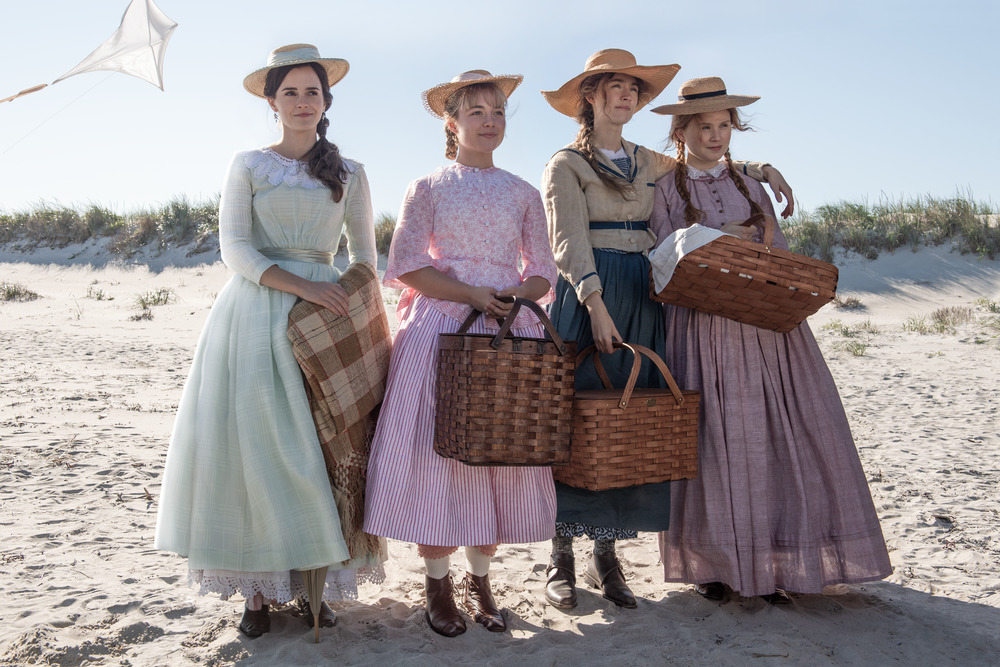
With timeless, universal themes, and fully imagined characters Gerwig’s Little Women is not only a faithful adaptation to the beloved novel but is a new classic in its own right.
Poignant, unforgettable, and endlessly watchable, Little Women is a celebration of the journey from girlhood to womanhood. The March sisters provide guidance and lessons we can still learn from today. Be persistent, every act of kindness counts, and be true to yourself even in the face of adversary. Little Women‘s triumphant display of the bonds of sisterhood and the power in all women can lend us the strength we need most in these troubled times.


Comments are closed.